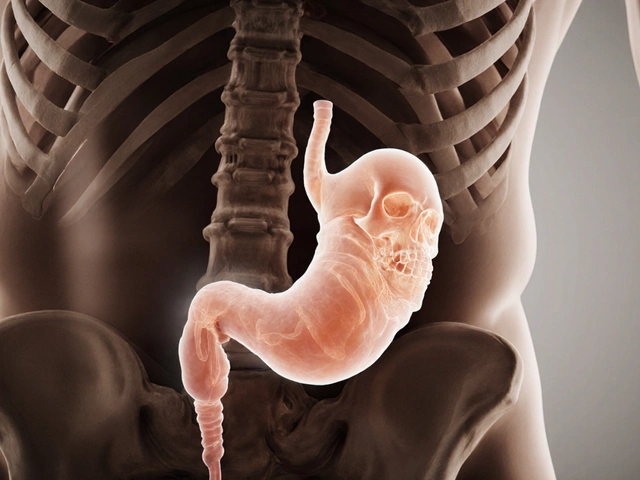In vitro fertilization, commonly known as IVF, has become a beacon of hope for many individuals and couples looking to conceive. However, as with any medical procedure, IVF is not without its share of side effects. These can range from the mild and manageable to the occasional severe complications.
Exploring these side effects isn't just about knowing what to expect; it's about empowering yourself with the knowledge needed to navigate this journey with confidence. Whether you're concerned about physical discomforts or the emotional rollercoaster, understanding these experiences can make a significant difference in how you handle the process.
- Introduction to IVF
- Common Physical Side Effects
- Emotional Impact of IVF
- Rare but Serious Complications
- Managing Side Effects
- Tips for a Positive IVF Experience
Introduction to IVF
In the realm of assisted reproductive technology, in vitro fertilization stands out as a pioneering method that has brought joy to countless families worldwide. This procedure, commonly referred to as IVF, involves the fertilization of an egg by sperm outside the body. Developed over four decades ago, it has evolved dramatically, becoming more efficient and accessible over the years. The process begins with the stimulation of the ovaries to produce multiple eggs, which are then retrieved and fertilized in a laboratory setting. After a few days, the viable embryos are transferred into the uterus, where they hopefully implant and grow. This step-by-step orchestration is meticulously tailored to each individual’s needs which underlines the complexity and customized nature of the treatment.
One of the fascinating elements of IVF is how it merges cutting-edge science with deeply personal human emotions. It's a journey that is both technical and tender, requiring not just a rigorous medical protocol, but also an understanding of the emotional landscape of those involved. Each IVF cycle is a story of hope, perseverance, and sometimes, anxiety and disappointment. While the fertility treatment turns hope into a tangible plan, it often challenges the emotional resilience of patients and their families. It’s no wonder that the experience of IVF can feel like a rollercoaster, filled with moments of intense anticipation and sometimes heart-wrenching setbacks.
Dr. Robert Edwards and Dr. Patrick Steptoe led the way in creating the first IVF baby, Louise Brown, in 1978, a breakthrough that would transform reproductive medicine forever. Their work laid the foundation for an entire industry dedicated to helping people achieve their dreams of parenthood. According to the Centers for Disease Control and Prevention, over 8 million babies worldwide have been born through IVF and related technologies, proving that the procedure is not only popular but also integral to combating infertility issues. Despite its revolutionary potential, patients often enter IVF with questions and concerns about potential risks, the success rate, and of course, the IVF side effects that may accompany this journey.
“In vitro fertilization is not just a medical procedure; it’s a pathway to building families when nature has led us down a different road.” – Dr. Samantha Morris, Reproductive Endocrinologist.
Understanding IVF involves more than just grasping the mechanics of fertilization and embryo transfer; it encompasses a broader spectrum of insights into genetic screening options, emerging technologies like cryopreservation, and the ethical considerations that propagate discussions within this field. The promising advancements in technology continue to enhance the efficacy of IVF cycles, offering individuals with previously untreatable infertility factors a chance at conception. The pathway of science and empathy converges here, enabling not only the creation of life but also the crafting of dreams. As couples or individuals contemplate this path, a thorough understanding of every aspect of IVF not only informs but empowers them to navigate their options with confidence and clarity.
Common Physical Side Effects
Embarking on an IVF journey involves understanding the array of physical side effects that may accompany the procedure. The most frequently reported symptoms arise from the hormonal medications used in preparing the ovaries. These medications aim to stimulate the ovaries to produce multiple eggs, but they can lead to side effects, including abdominal bloating and discomfort. This is due to the ovaries enlarging as they produce more eggs than usual. For many, this bloating is akin to the sensation felt during a menstrual cycle but can be more intense.
Fatigue is another commonly reported side effect. The combination of hormones alongside the emotional stress of the process can leave many feeling exhausted. It's not just physical fatigue, but a psychological weariness that can seep into daily life. It's crucial for individuals to acknowledge this and allow themselves rest. Staying hydrated and maintaining a balanced diet can also help alleviate some of the physical weariness experienced during fertility treatment.
Some individuals may experience mild headaches and mood swings due to the fluctuation in hormones. These are akin to premenstrual symptoms in intensity but can sometimes escalate. Managing these symptoms can be as simple as treating them the way one would handle a typical headache, such as using over-the-counter pain relief after consulting with a physician. Recognizing that these effects are part of the body’s response to hormonal changes can make them more manageable mentally.
The American Society for Reproductive Medicine notes, "While side effects can be challenging, understanding their nature helps individuals prepare and deal with them more effectively."
Breast tenderness is another side effect that many encounter. The hormonal stimulation process can make breasts tender or swollen, similar to pre-menstrual symptoms but possibly a touch more intense. Wearing supportive garments and avoiding activities that exacerbate the discomfort can provide relief. Awareness of such side effects before beginning IVF allows individuals to plan accordingly and adopt measures that enhance comfort.
Nausea and occasional lightheadedness might also occur for some. Experiencing dizziness isn't uncommon, particularly after administering the hormonal injections. This can be a result of sudden hormonal shifts. Taking time to rest and ensuring proper fluid and food intake following treatments can mitigate these sensations to a degree. It's essential to stay vigilant about hydration and nutrition to cushion against such symptoms. Understanding these side effects prepares individuals for the ride ahead, allowing them to address each physical challenge with informed steps and an adaptive mindset.

Emotional Impact of IVF
Embarking on the in vitro fertilization journey is not just a medical procedure; it is an emotional expedition filled with highs, lows, and everything in-between. The emotional landscape during IVF can often feel like riding a rollercoaster, with each day bringing its own set of challenges and triumphs. Firstly, the anticipation and hope that accompany the decision to start IVF can be invigorating, as individuals and couples envision their potential future family. However, the process can quickly become overwhelming as one navigates the complexities and uncertainties of IVF.
Many people undergoing IVF experience a whirlwind of emotions, from hopefulness to anxiety, sometimes all in one day. As the cycle progresses, the hormones required for the treatment can exacerbate mood swings, leaving individuals feeling frustrated or exhausted. This emotional turmoil is often compounded by the fear of the unknown, as the results of each treatment phase remain elusive until the very end. For many, the emotional strain is a balancing act, constantly recalibrating between optimism and the possibility of disappointment.
Moreover, there is often a sense of isolation despite the best efforts of supportive partners, friends, and family. The emotional impact can be profoundly personal, often more intense than expected. According to a study published by the National Institutes of Health, infertility and its treatments, including IVF, are associated with increased levels of anxiety and depression among patients. In fact, many describe the IVF process as one of the most emotionally challenging experiences of their lives.
It is crucial to acknowledge that while these feelings are valid and part of the process, there are ways to mitigate their intensity through support groups, counseling, and open communication. Speaking with others who have been through similar experiences can bring a sense of community and understanding. As Dr. Alice Domar, a respected psychologist and researcher in this field, once said,
"Dealing with infertility and IVF is akin to being in a maze. Sometimes, hearing from others who have navigated the same paths can make the journey more bearable."
In addition to social support, developing personal coping strategies can make a significant difference. Techniques such as mindfulness, journaling, or simply allowing oneself the time to process emotions without judgment can provide relief. Engaging in these practices encourages a healthier emotional state, allowing individuals to approach their IVF journey with more resilience and hope.
Rare but Serious Complications
Despite the promising success of in vitro fertilization (IVF), there are rare but significant complications to consider. One of the major concerns among healthcare professionals is Ovarian Hyperstimulation Syndrome (OHSS). This condition occurs mainly due to the overstimulation of the ovaries by fertility medications, leading to swollen, painful ovaries and, in severe cases, fluid accumulation in the abdomen and chest. Symptoms may worsen rapidly, necessitating prompt medical attention. While OHSS typically resolves on its own, rare instances might require hospitalization. Understanding these risks is essential for anyone considering IVF, as they can impact overall treatment success and well-being.
Another concern not often discussed is the increased likelihood of multiple pregnancies. While the thought of twins or triplets might sound appealing to some, such pregnancies come with higher risks like preterm birth, low birth weight, and developmental complications for the babies. Additionally, it's pertinent for potential parents to recognize the increased strain multiple births can put on their physical and emotional resources. This possibility arises from the practice of transferring more than one embryo to increase pregnancy chances. In a statement by the American Society for Reproductive Medicine, an industry expert highlighted, “The goal should always be the healthiest pregnancy possible, not necessarily just a positive test result.”
IVF procedures might also raise the risk of ectopic pregnancies, where the fertilized egg implants outside the uterus, often in a fallopian tube. This form of pregnancy can't persist normally and can be life-threatening if not addressed promptly. Medical intervention is crucial, which might involve medication to dissolve the pregnancy or surgical intervention to remove it. Understanding the symptoms, such as sharp abdominal pain and dizziness, can lead to earlier medical consultations and, thus, fewer long-term implications.
Moreover, while the link isn't robustly conclusive, there have been discussions regarding a potential slight increase in certain cancer risks post-IVF, particularly in women who have undergone extensive hormone treatments. Researchers continue to explore these associations to provide clearer insights. For many women considering IVF, these potentials present a precarious balance between hope for starting a family and the need to remain informed about health implications. A noteworthy statistic from a 2022 global study indicated that less than 1% of IVF cases reported these severe reactions, underscoring their rarity but necessity for awareness.
In light of these potential outcomes, it remains vital that those embarking on an IVF journey engage in open discussions with their fertility specialists. Exploring these rare risks in detail can aid in making informed decisions that align with personal health goals. Starting an IVF adventure requires thorough preparation and realistic awareness of all potential paths, offering the best safeguards for a healthy, happy future with new family members.

Managing Side Effects
Undergoing IVF treatment can indeed be a strenuous experience, not only emotionally but physically as well. Knowing how to manage the side effects that come with it is essential in making this journey as comfortable as possible. Although some discomfort may be unavoidable, there are practical strategies you can adopt to alleviate these symptoms. Having a balanced diet plays a critical role, as certain foods can help reduce bloating and discomfort often associated with hormonal changes due to IVF. Hydration should not be underestimated, as drinking plenty of water can ease feelings of bloatedness and promote overall wellness.
Self-Care and Rest
Among the most recommended ways to manage side effects is engaging in sufficient self-care and ensuring you get adequate rest. Your body is undergoing substantial changes during IVF, and it needs time to adjust and recover from the hormonal influx. Gentle exercises, like walking or yoga, can improve circulation and relieve stress. However, it's crucial to listen to your body and avoid overexertion. Relaxation techniques such as meditation, deep-breathing exercises, or even acupuncture have been found to help in alleviating stress and anxiety levels, allowing both your mind and body to relax.
Emotional Support Channels
Beyond physical symptoms, IVF can often lead to a whirlwind of emotions. Tapping into emotional support resources, perhaps through therapy or support groups, can be a game-changer. Surrounding yourself with understanding friends or participating in online forums with others who are undergoing similar experiences can offer not only comfort but practical advice as well. As the old adage goes, a problem shared is a problem halved. The American Society for Reproductive Medicine encourages talking openly about your feelings, which helps in managing emotional side effects, and even suggests professional counseling for those who might find speaking with a therapist more beneficial.
The emotional and physical toll of IVF can be immense, but knowing you are not alone in this journey makes all the difference.” – Dr. Sarah Johnson, Reproductive Endocrinology
Monitoring and Professional Guidance
Regular monitoring by your fertility specialist is vital. This isn’t just about checking how well your body is responding but also an opportunity to discuss any concerns or symptoms you're experiencing. They can offer medical advice personalized to your needs, prescribe medications if necessary, or suggest lifestyle changes to manage side effects better. It's key to maintain open communication with your doctor; nothing is ever too small if it's a concern to you. Keeping a diary of your symptoms can be helpful both for yourself and your healthcare provider to spot patterns and manage your treatment accordingly.
| Common Side Effects | Management Techniques |
|---|---|
| Bloating | Increase water intake; eat high-fiber foods |
| Emotional Instability | Therapy, support groups, meditation |
Remember also the importance of seeking understanding from your workplace. Explaining your treatment and potential need for flexibility with work hours could ease logistical stresses. This journey can be daunting, but with the right strategies in place, it becomes a highly rewarding pursuit towards a hopeful future.
Tips for a Positive IVF Experience
Embarking on the IVF journey can evoke a myriad of emotions, ranging from excitement and hope to anxiety and fear. Though the process can be challenging, there are ways to cultivate a positive experience. A key strategy is fostering a strong support system. Whether it's leaning on family, friends, or joining a support group with others undergoing fertility treatments, sharing experiences mitigates feelings of isolation. These connections often provide encouragement and practical advice, turning the daunting nature of IVF into a shared journey.
It’s also essential to maintain open, ongoing communication with your medical team. Many people find it helpful to jot down questions as they come to mind so they're remembered during appointments. This ensures all concerns are addressed and helps clarify steps in the IVF process. A well-informed patient can make better decisions, reducing stress and increasing confidence as you move forward.
Physical health plays a pivotal role in how one experiences IVF side effects. Engaging in regular, gentle exercise such as yoga or walking can ease stress and improve overall well-being. Staying hydrated and eating a balanced diet rich in nutrients contribute to your body’s resilience throughout the treatment. Avoiding excessive caffeine and alcohol can also help maintain your physical readiness and optimize the chances of a successful cycle.
In the realm of the mental, consider integrating relaxation techniques such as deep-breathing exercises, meditation, or mindfulness into your daily routine. These practices not only help manage stress but also enhance mental clarity, which can be particularly beneficial during emotionally turbulent times.
Some partners find that setting shared goals and acknowledging small victories throughout the process fosters connection and positivity. Even activities as simple as weekly date nights or planning post-treatment getaways can help maintain focus on each other and the broader picture. Remember, nurturing your partnership during such an emotionally charged journey can strengthen your relationship and provide a reliable retreat from potential setbacks.
While the possible outcomes of IVF may be unpredictable, managing expectations realistically aids emotional stability. Understanding the various labor-intensive aspects of the process, coupled with its potential outcomes, prepares both mind and body for the journey ahead. According to the American Society for Reproductive Medicine, ‘one-third of IVF cycles typically result in a live birth.’ Such figures help establish realistic perspectives and prepare couples for possible multiple attempts.
A Harvard Health article emphasizes, 'Even when IVF doesn’t lead to a pregnancy immediately, couples often find the process a step towards closure or clarity about future family planning steps.'





